
Culinary careers are sizzling again as the hospitality and restaurant industry bounces back from the pandemic and seeks to fill the positions vacated during the COVID-19 downturn. Chaffey College is doing its part to get more cooks in the kitchen.
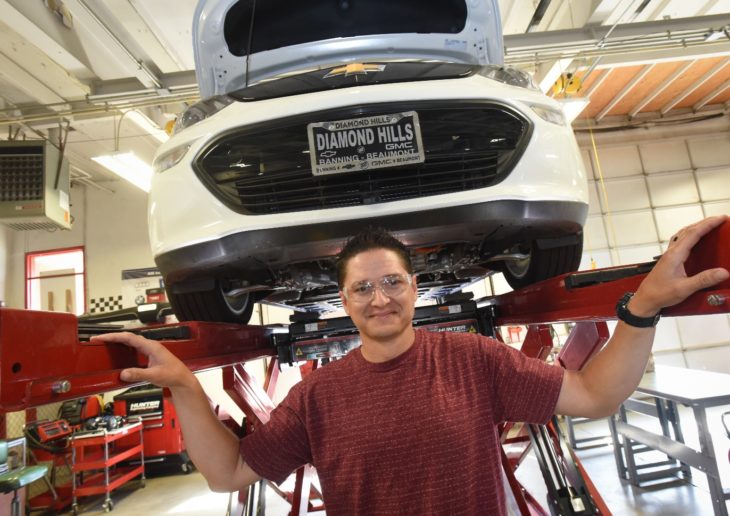
By Kris Lovekin / Inland Empire/Desert Regional Consortium
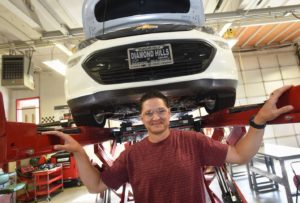 San Jacinto – May 2018. Daniel Bailey deployed three times to Iraq as a U.S. Marine. He was happy to serve and loved his Marine family. But a shoulder injury put an abrupt halt to that part of his life. For a time he felt lost.
San Jacinto – May 2018. Daniel Bailey deployed three times to Iraq as a U.S. Marine. He was happy to serve and loved his Marine family. But a shoulder injury put an abrupt halt to that part of his life. For a time he felt lost.
As a civilian, his children were schooling himon the rules of the house. He applied for jobs based on his 12 years of military experience, and civilian recruiters asked, “Yes, but what else have you done?”
People reminded him about his G.I. Bill, and how he could go back to school. But that didn’t appeal. “You say test and I get anxiety,” he said.
Then he did something unexpected. Bailey, 34, listened to his mother-in-law, the proud owner of a 1972 VW Beetle that needed to be refurbished.
“She said, ‘Mt. San Jacinto (College) has an Auto Tech program. You like to tinker. Go try that out.’”
Turns out, she was right. Bailey liked the practical nature of the program, the teamwork, and the sense of accomplishment. “You can fix cars, you can’t fix people,” he said. But he might be wrong about that.
In the process of going to school, he fixed himself.
He has become a good researcher, because he wants to know about the idiosyncrasies of different vehicles. He has conquered his test anxiety because the tests are “hands on” observations of his work, something the military prepared him for.
Bailey wears a huge grin as he gazes at the well-stocked tool room, packed with thousands of tools for every vehicle repair need. He has found new confidence in his abilities and a new mission for his future. His home life is stronger, and yes, his mother-in-law’s ‘72 Beetle is looking good.
“He is arguably my best student,” said Bob Pensiero, a longtime faculty member at Mt. San Jacinto College who leads a program that currently has 180 students. “He will do well.”
Automotive/Transportation Technology is one of the largest of the 22 Career Education programs offered at Mt. San Jacinto College. All together, there are 7,000 students taking Career Education classes.
 “These are high cost programs,” said Dean Joyce Johnson, who leads Career Education programs. They require smaller class sizes and expensive upgrades on equipment.
“These are high cost programs,” said Dean Joyce Johnson, who leads Career Education programs. They require smaller class sizes and expensive upgrades on equipment.
But California lawmakers three years ago sent a big upgrade in ongoing funding levels, about $200 million each year for California community colleges. The money is known as “Strong Workforce.” Johnson said she notices the difference.
“Our reputation is rising in the eyes of our board and our leadership,” Johnson said. Instead of being a drain on the budget, Career Education programs are pulling their own weight.
The Menifee Valley Campus of Mt. San Jacinto College has a new “Makerspace” with 3D printers and high definition laser cutting tools lined up, ready for use. Designed in partnership with the business program and the bioengineering program, the MSJC Eagle MakerSpace will turn out to be a resource for the entire campus. Sometimes medical and dental models can be manufactured with 3D printers. Sometimes theater faculty get excited about creating theater props.
“There are going to be so many opportunities for people to come together,” said Tom Oxford, a consultant who works with Mt. San Jacinto College on the Eagle MakerSpace. He said when it opens this fall it will attract students who want to experiment with technology. Once they have hands on experiences with the equipment, they know more about what they want to do for a career.
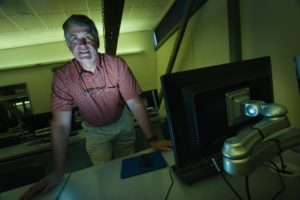 Glenn Stevenson,the chair of the program in Computer Information Systems (CIS), said he will definitely use the Eagle MakerSpace when it opens. A faculty member recruited 15 years ago from the computer industry in Orange County, he decided he loved teaching, despite the fact that teaching pays less than his industry jobs.
Glenn Stevenson,the chair of the program in Computer Information Systems (CIS), said he will definitely use the Eagle MakerSpace when it opens. A faculty member recruited 15 years ago from the computer industry in Orange County, he decided he loved teaching, despite the fact that teaching pays less than his industry jobs.
Using Strong Workforce money, he just rewrote the curriculum for the classes leading to Cisco certification, because it is so important in the industry. He has another suggestion for the money. “I want to be able to pay the entrance fee for our students who are ready to take the Cisco Certified Network Associate exam,” he said. That fee can be a barrier for some low income students.
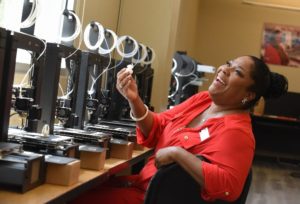 “And we need to do more to develop internships,” he said to Avante Simmons,a recently arrived director of Career and Workforce Programs who was visiting his classroom in Menifee. Her face lit up.
“And we need to do more to develop internships,” he said to Avante Simmons,a recently arrived director of Career and Workforce Programs who was visiting his classroom in Menifee. Her face lit up.
“We just hired a job developer,” she said. The new hire has already made connections with the Chamber of Commerce and the city government offices in San Jacinto and Menifee. She will help faculty members find the internships and the jobs that will give students a smooth transition into the workforce. Or as smooth as possible.

A tiny swan printed on the 3D printer is just one example of what can be made with this new technology purchased with money from Strong Workforce funding. Photos by Kurt Miller
Stevenson said his students sometimes find that hiring managers have the idea that only someone with a four-year degree is worth considering. But with the strength of community college tech programs, that is an outmoded idea.
The Strong Workforce philosophy is that community colleges, with the right resources and the right ties to industry, will be the perfect place to launch students into the workforce, which will enhance California’s economy.
“It has brought a lot of light,” said Dean Johnson. Because the money ties community college programs to the needs of industry, one of her favorite questions to faculty members is “What does your advisory board say?” If the faculty member does not have an advisory board to ask, that is the first thing to fix.
For instance, updating and aligning the curriculum for the Child Development program in partnership with local childcare facilities not only prepares students for local jobs. But working child development teachers can go back to Mt. San Jacinto College for their required continuing education credits. It’s a two-way street.
That kind of standardization makes it easier for CTE students to move from one college to another without losing their forward momentum. If the auto tech curriculum is standardized, Daniel Bailey’s family could move from Winchester to Riverside and he could still finish out his schooling.
He likes the idea of his team having his back.

A tiny swan printed on the 3D printer is just one example of what can be made with this new technology purchased with money from Strong Workforce funding. Photos by Kurt Miller
“I came into the program knowing nothing about the industry,” Bailey said. “And now I have access to all the online auto references.” He works on the latest in hybrid and electric engines, because Mt. San Jacinto College invested Strong Workforce money in two new vehicles that will help students get ready for the reality of the issues that are presented by new technology.
The goal of improving career and technical programs is a boon for veterans returning to civilian life. But it is just as effective for high school graduates, or single moms living from paycheck to paycheck.
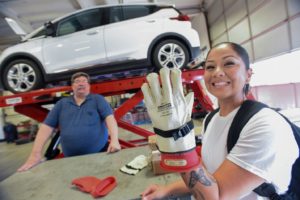
Robert Pensiero, longtime faculty member in Automotive/Transportation Technology, instructs Natalie Hernandez in the safety precautions necessary before working on high voltage electric engines. Photo by Kurt Miller
Natalie Hernandez is one of the growing number of women in the Automotive/Transportation Tech program at Mt. San Jacinto College, and on top of her certificate for auto repair, she will earn her associate’s degree. The mother of two young children, Natalie said she chose auto repair because she has always liked cars, and because auto repair jobs pay well, about $46,000 per year.
“They have good financial aid here,” she said of Mt. San Jacinto College. It was enough to let her pay for her fees and books, as well as childcare and gas as she drove back and forth to class.
“I would not have made it without MSJC,” she said.
She will be the first person in her family to graduate from any kind of college. She is looking forward to the ceremony, and to her family coming to cheer her on. Her father serving a life sentence in prison, so he will not be there to see it. But her mom and her two children will be.
“I want to teach my kids how to work on cars,” she said.
Find out more about Career Education programs at Mt. San Jacinto College:
https://www.msjc.edu/cte/Pages/default.aspx
———————
Strong Workforce Program: To develop more workforce opportunity and lift low-wage workers into living-wage jobs, California took a bold step in 2016 to create one million more middle-skill workers. At the recommendation of the California Community College Board of Governors, the Governor and Legislature approved the Strong Workforce Program, adding a new annual recurring investment of over $200 million to spur career technical education (CTE) in the nation’s largest workforce development system of 114 colleges. For more information about Strong Workforce, please visit: http://doingwhatmatters.cccco.edu/StrongWorkforce/Overview.aspx.
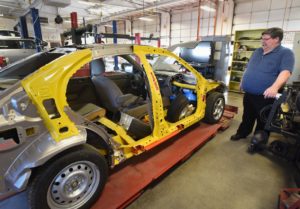
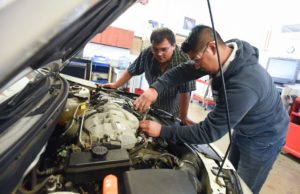
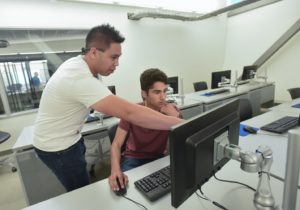

Culinary careers are sizzling again as the hospitality and restaurant industry bounces back from the pandemic and seeks to fill the positions vacated during the COVID-19 downturn. Chaffey College is doing its part to get more cooks in the kitchen.
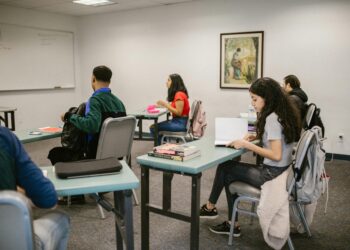
Dual Enrollment (DE) is catching on as students and their families recognize the advantages of earning college credit while still working towards high school graduation. But students aren’t the only… Read More – Good News for Community Colleges: Dual Enrollments Are on the Rise
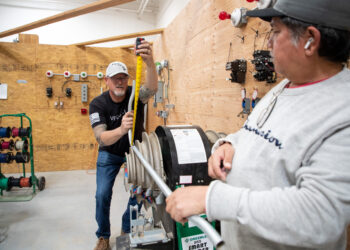
Enrollment in courses not offering credit toward a degree or certificate are outpacing for-credit programs in some states (Fed Communities). And it’s no wonder. With the convenience, minimal time commitment,… Read More – No Credit, No Problem: Noncredit Courses Gain Steam